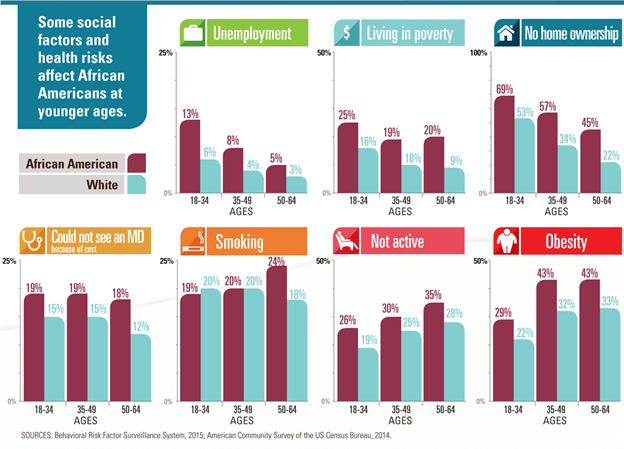African Americans and Heart Disease: We Must Do Better
Feb 22, 2021, 12:03 PM
By Nathan Painter, PharmD, CDCES, FADCES
In searching the CDC and the Office of Minority Health (part of HHS), it’s plain to see that there is a problem. We can talk all day about why there is a problem, but that’s not what my focus is here.
- In 2018, African Americans were 30 percent more likely to die from heart disease than non-Hispanic whites.
- Although African American adults are 40 percent more likely to have high blood pressure, they are less likely than non-Hispanic whites to have their blood pressure well managed.
- African American women are 60 percent more likely to have high blood pressure, as compared to non-Hispanic white women.
- Non-Hispanic Black adults are diagnosed less often than Non-Hispanic White adults despite getting a lipid panel more often. We are missing the target on this and need to change.

Multiple factors affect patient health outcomes, including social determinants of health that are estimated to account for 30-55% of all health outcomes. Social determinants of health are conditions in which individuals are born, live, work, learn, play and age that affect health, risks, functioning and outcomes. There are five key areas of social determinants of health: economic stability, neighborhood and built environment, social and community context, education access and quality, and healthcare access and quality. Examples of social determinants include safe housing, poverty, transportation, socioeconomic conditions, etc. Social determinants of health can influence health inequities.
Despite national advances in medical technology, health disparities remain and minorities experience higher morbidity and mortality. A health disparity is defined as differences in the overall rate of incidence, prevalence, morbidity, mortality and survival rates in a population as compared to the health status of the general population. One example of a health disparity, as already mentioned, is non-Hispanic Blacks and higher rates of death from coronary heart disease. Populations experiencing health disparities may struggle with economic stability, occupational environmental hazards and lack of access to quality health care, which contribute to health outcomes.
There are approaches we can take to make a change.
- Use proven programs to reduce disparities and barriers to create opportunities for health.
- Work with other sectors, such as faith and community organizations, education, business, transportation and housing to create social and economic conditions that promote health starting in childhood.
- Link more people to doctors, nurses or community health centers to encourage regular and follow-up medical visits.
- Develop and provide trainings for healthcare professionals to understand cultural differences in how patients interact with providers and the healthcare system.
February is American Heart Month and an important time to reflect on the connection between cardiovascular disease and diabetes. For more information, visit DiabetesEducator.org/CVD. Exclusively for ADCES members, you can access this and other topics related to minority health and disparities in the ADCES Cultural Diversity COI.
ADCES Perspectives on Diabetes Care
The Association of Diabetes Care & Education Specialists Perspectives on Diabetes Care covers diabetes, prediabetes and other cardiometabolic conditions. Not all views expressed reflect the official position of the Association of Diabetes Care & Education Specialists.
Copyright is owned or held by the Association of Diabetes Care & Education Specialists and all rights are reserved. Permission is granted, at no cost and without need for further request, to link to, quote, excerpt or reprint from these stories in any medium as long as no text is altered, and proper attribution is made to the Association of Diabetes Care & Education Specialists.
HEALTHCARE DISCLAIMER: This site and its services do not constitute the practice of medical advice, diagnosis or treatment. Always talk to your diabetes care and education specialist or healthcare provider for diagnosis and treatment, including your specific medical needs. If you have or suspect that you have a medical problem or condition, please contact a qualified health care professional immediately. To find a diabetes care and education specialist near you, visit DiabetesEducator.org/Find.